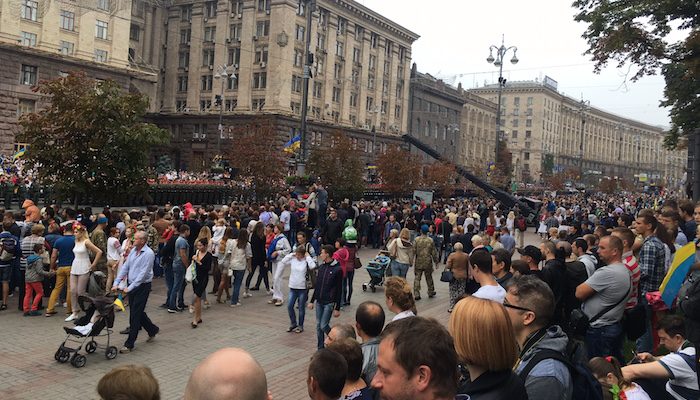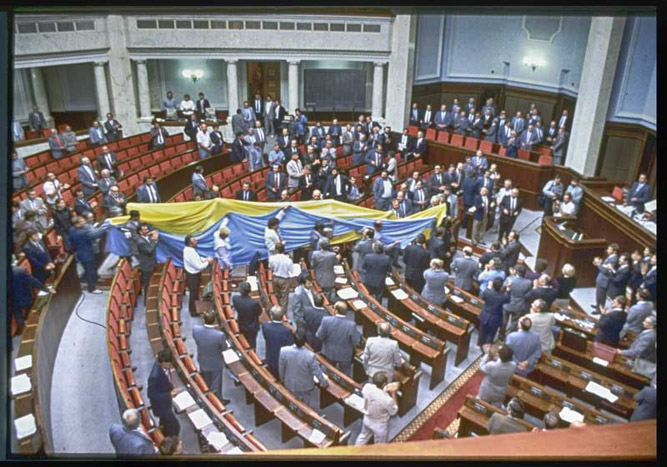
“What’s changed?” he asked. A young journalist was interviewing me in one of Ukraine’s regional capitals in the summer of 2016. We were sitting in a beautifully refurbished old building that houses a private TV Studio. Exposed brick. Air conditioning. High speed internet connection. He’d asked me to switch my cell phone to vibrate before the broadcast began. “Just look around,” I answered. “None of this existed 25 years ago.”
The question what’s changed, and the complaint that little has changed, is heard often in Ukraine there days. As the country celebrates 25 years of modern statehood, a Russian sponsored war continues to ravage its eastern areas of the Donbas. Part of its territory, the Crimean peninsula, is occupied by Russia. Reforms are moving at a pace that many feel are too slow. And, Ukraine continues to be on the receiving end of a sophisticated information war coming from the Kremlin, part of which is aiming to demoralize the country. Many of these themes are addressed in my recent book.
Yet, if one steps back and looks at things from a quarter century perspective, one would see that despite the problems, so much has changed that the place is hardly recognizable from what it was like in 1991. This is very noticeable in the media sector.
When Ukraine’s parliament voted for independence on 24 August 1991, there were only a handful of foreign journalists who witnessed the event. I was one of them, reporting for the British newspaper The Guardian. To file my story I had to run home, call the phone operator, order an international line, then wait. When she called back and connected me to London, I had to dictate my report over the phone, three words at a time, and spell all the Ukrainian names twice. Luckily, that day, the line came through in time for the filing deadline. Back in 1991 newspapers appeared once a day, occasionally twice, and had to be sent for printing at a certain time. So if you missed the deadline, your story did not appear.

Raising of republic’s flag inside (still Lenin-statued) Parliament following declaring of independence. Image by Efrem Lukatsky.
This summer I once again paused my academic pursuits to work as a journalist, for Hromadske Radio (Public Radio Ukraine). It’s an independent station that was set up three years ago by a handful of journalists. I’ve started an English language weekly podcast for them, so I interview people in studio, over the phone, or via Skype from Kyiv and all over the world. When I’m done, the podcast gets posted on-line. Anyone can listen at their convenience, anywhere where there is an internet connection.
I asked Oleksander Tkachenko what were the most significant changes he saw. In 1991 he was a young journalist working for Ukrainian state TV, and one of the first Ukrainians to work for a western media outlet. He broke the story of Ukraine’s independence for Reuters on 24 August 1991. Today he is the CEO of 1+1 Media Group, one of Ukraine’s largest media corporations. This is what he said looking back over 25 years:
The most important change is that fear is gone. It used to be dangerous to be an independent journalist in Ukraine. And back then, it was also a challenge for us to get society to trust us. Over time, journalists have established themselves as a source of information, one safeguard for a free, democratic society.[1]
Tkachenko personifies the changes in Ukraine’s media. Both structural and human. When Ukraine declared independence on 24 August 1991, its media was part of a state owned, centralized system controlled in Moscow. There were three TV channels and three radio channels with national broadcast reach. Kyiv’s government didn’t control broadcast frequencies or communications systems on its territory, nor the production or distribution of print media. The majority of media content was in Russian. There was no internet, and very little direct contact with the outside world.
Today Ukraine’s media system resembles those in established democracies in most ways. It’s large, diverse, mainly privately owned, and linked to global communications networks. In 2014 there were 1,563 broadcast licences in effect, the overwhelming majority held by private stations. An estimated 4,000 print media outlets reportedly publish regularly, including the popular English language Kyiv Post.
The transformation happened gradually and the problems which remain today result from the way the system was transformed. On the positive side, one of the first things the new Ukrainian government did was disentangle from the Soviet media system, establish control over their information space, and integrate into global communications networks. The second step was privatization of state media assets. This happened in the mid-1990s during the presidency of Leonid Kuchma, as part of his larger privatization campaign. However, this was done in a non-transparent manner. Emerging businessmen who had connections to the President were given broadcast licences and this made them vulnerable to political pressures for decades to come, since they could have their licences withdrawn at any time. Also, Kuchma kept the most powerful TV and radio channel in state hands, since he saw it as an instrument of power rather than a public broadcaster. By the early 2000s media ownership began to be concentrated, and by the mid- 2000s a few large corporations controlled over 80% of the media system. Infotainment became commonplace and media content was purchased from abroad, with a large portion coming from Russia.
Around the same time the internet began spreading in Ukraine. It became an important island of free speech since neither the state nor the corporate world could control it. This was particularly significant when censorship intensified during Kuchma’s second term in office (1999-2003) and when Victor Yanukovych was in power (2010-2014). When things looked really bleak, journalists began setting up web-based media outlets. One was Hromadske Radio. They posted their first podcast on 23 August 2013, the day before Ukraine’s independence anniversary. It was an interview with Ukraine’s first President, Leonid Kravchuk.
One of the founders was Andriy Kulykov. He worked as a print journalist during the Soviet era, and after Ukraine became independent he was hired by BBC to work for their Ukrainian Service in London, England. Unable to stay away from Ukraine for too long, he returned in the mid-1990s and worked on various TV projects, went back to England for a second BBC stint and returned for good in 2005. He became one of Ukraine’s top journalists, hosting a live weekly political talk show on one of the major commercial channels. But at heart he’s a radio man, and a big believer in public broadcasting. He and his Hromadske Radio team have been pushing for change from below, to try and establish public broadcasting in Ukraine. After Yanukovych was toppled in February of 2014, these efforts were joined from above. The new government renewed the push to transform the remaining state broadcasters into public ones. The State TV and Radio Company got a new director, the charismatic Zurab Alasania from Kharkiv. New legislation was adopted and things began moving. Hromadske Radio received airtime on national state radio.
But, gradually things got bogged down, like they did after the 2004 Orange Revolution when the state took steps to give up control over broadcasting, then pulled back. I asked Kulykov what’s needed to make it really happen this time.
Journalists need to be more active to move things forward. More journalists with established reputations need to get involved.” he answered. Then he added, “People in Ukraine don’t really understand, don’t believe in the idea of public broadcasting. There needs to be pressure from the audience, from the public to push the government to create a properly functioning public broadcasting system.[2]
So, after twenty five years Ukraine’s media system has drastically changed. But like the rest of the country, it is a work in progress. Judging by how much has already been done, and the spirit that comes from society, including journalists, I’m looking at the next 25 years with optimism and hope.
Notes
[1] Interview with Oleksander Tkachenko, CEO 1+1 Mee dia Group, 17 August 2016, Kyiv, Ukraine
[2] Interview with Andriy Kulykov, Chairman of the Board, Hromadske Radio, 23 August 2016, Kyiv, Ukraine.
Further Reading on E-International Relations
- Ukraine and the Russian Challenge to the European Order
- Russia-West-Ukraine: Triangle of Competition 1991–2013
- Opinion – Russian Motives in Ukraine and Western Response Options
- Causes and Potential Solutions to the Ukraine and Russia Conflict
- Ukraine and Russia Gird for Presidential Election
- Putin’s Illusions and Ukraine’s Reality: Myth vs Westward Integration